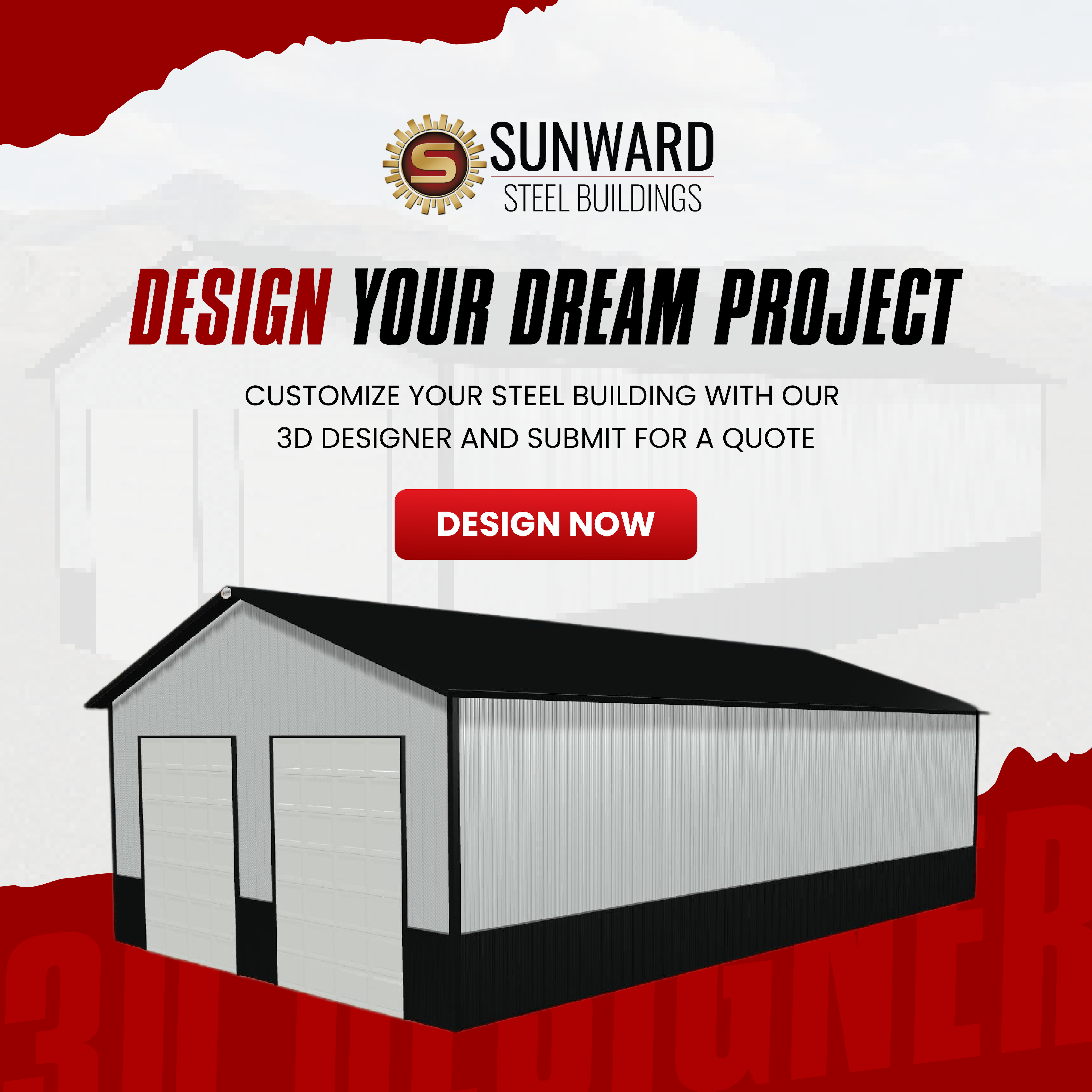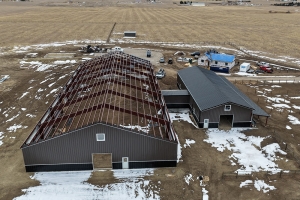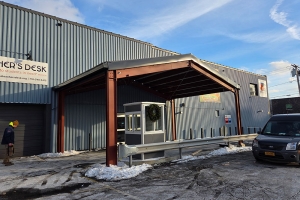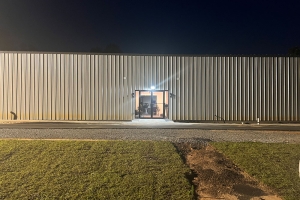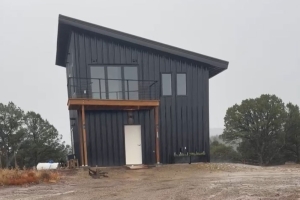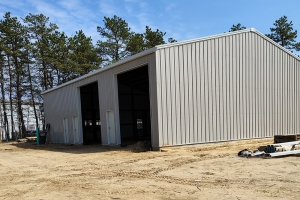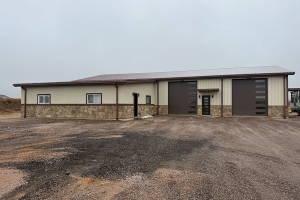Metal Garage Vs Wood Construction: What’s The Smart Choice?
November 21, 2024 | Uncategorized
There are many reasons why garages serve as valuable assets for organizations of all sizes, whether it’s providing secure storage solutions for vehicles, equipment, inventory, or more. Whether you run a small automotive shop, need extra space for fleet storage, or want a protected area for tools and machinery, choosing the right type of garage can directly impact your business operations. For many business owners, the choice comes down to two primary materials: metal and wood.
Each option has its advantages, but which is the smarter choice for your company’s needs? The following guide will compare the differences between metal and wood garages to help you make an informed decision for your business.
Optimizing Commercial Garages With The Right Material Choices
When constructing a commercial garage, selecting the right materials can have a big impact on your company’s efficiency and bottom line. The choice of material influences not only the durability and lifespan of the structure but also the ease of maintenance and potential long-term savings.
Factors like structural integrity, the ability to withstand heavy usage, and resistance to environmental wear and tear are crucial. Metal garages, for instance, often offer superior strength and resilience compared to traditional wood construction, making them ideal for businesses that require robust storage solutions.
Understanding how different materials perform in commercial settings can help you optimize your garage space, ensuring it meets your operational needs while maximizing value over time.
Metal Vs Wood: A Detailed Comparison Of Key Features
Metal and wood garages each have distinct characteristics, influencing aspects like construction time, maintenance requirements, weather resistance, and long-term investment potential. Understanding these differences can help you make a strategic choice that aligns with your specific needs and budget.
Below is a side-by-side comparison of the most important features to consider when deciding between metal and wood garages. This will give you a clear view of which option best suits your commercial space.
| Feature | Metal Garages | Wood Buildings |
| Cost | Lower long-term costs with minimal repairs | Higher material and maintenance costs |
| Construction time | Quick prefabrication and assembly | Time-consuming, requires skilled labor |
| Durability | Resistant to fire, pests, and weather damage | Susceptible to moisture, rot, and termites |
| Maintenance | Minimal; occasional cleaning or repainting | Frequent inspections and repairs needed |
| Energy efficiency | Requires insulation upgrades for temperature control | Natural insulation but affected by weather |
| Environmental impact | Recyclable materials, low carbon footprint | Limited recyclability, deforestation impact |
| Regulatory and compliance | Pre-engineered design, consistent quality, easier permitting. | Traditional design, variable quality, complex permitting. |
| Aesthetic appeal | Modern, sleek, and customizable | Traditional, rustic, and warm appearance |
| Security and safety | Highly resistant to fire and vandalism | Vulnerable to fire and break-ins |
Cost Efficiency
For business owners, cost efficiency plays an essential role in choosing between a steel garage and a traditional wood structure. Here’s how steel garages stack up in terms of affordability:
- Lower initial construction costs: Pre-engineered steel buildings are manufactured and assembled quickly, reducing labor costs and minimizing disruptions to business operations.
- Reduced maintenance expenses: Steel garages are highly durable and require minimal maintenance compared to wood garages, which may face issues like rot, termites, or warping that necessitate costly repairs.
- Long-term savings: The longevity of steel structures means fewer repairs and replacements over time. As a result, you’ll have a stable, secure space that doesn’t require constant upkeep.
- Better investment value: The combination of lower maintenance costs and longer lifespan makes steel garages a smart financial investment, helping business owners maximize their budgets over the long term.
Construction Process And Timelines
The time it takes to construct a garage can significantly affect business operations, making material choice a critical consideration. Steel garages typically have a faster construction process compared to traditional wood structures for the following reasons:
- Faster assembly: Pre-engineered steel components are manufactured off-site with precise specifications, allowing them to arrive ready for quick assembly. Compared to traditional building methods, this can shorten the entire construction process by weeks, helping businesses get up and running in their new spaces without unnecessary delays.
- Less weather-dependent: Steel construction is more resistant to adverse weather conditions, such as extreme heat, snow, or rain, which can often halt wood construction projects. This resilience allows work to continue, keeping the project on schedule and avoiding costly delays that could disrupt business plans.
- Lower labor costs: The streamlined nature of assembling steel structures means fewer labor hours are needed, especially compared to the time-intensive process of framing and finishing a wood garage. This can result in substantial savings on labor expenses, making steel garages a more budget-friendly option for businesses looking to control costs.
- Minimal disruption: With the faster construction timeline of steel garages, businesses experience less disruption to their operations. The quicker turnaround allows business owners to use the new space sooner, minimizing downtime and helping maintain productivity throughout the expansion or renovation process.
Structural Durability
The structural durability of a garage is a key factor when it comes to making a long-term investment. Steel garages are known for their superior strength and longevity compared to traditional wood structures, making them ideal for organizations that require durable, reliable storage solutions.
- Strength and resistance: Steel is inherently stronger than wood, allowing it to withstand high winds, heavy snow, and even seismic activity. This makes steel garages especially suitable for businesses in areas prone to extreme weather, ensuring that valuable assets are well-protected.
- Longevity: Steel structures have a longer lifespan compared to wood buildings, which are susceptible to rot, termites, and warping over time. Unlike wood, steel does not suffer from these issues, maintaining its structural integrity for decades with minimal maintenance.
- Fire resistance: Steel is non-combustible, offering a higher level of fire resistance compared to wood. This characteristic not only enhances the structure’s safety but can also result in lower insurance premiums for businesses, providing additional cost savings over time.
Upkeep And Maintenance
When it comes to ongoing maintenance, steel garages have distinct advantages over traditional wood structures, making them a more practical choice for business owners seeking durability and cost-efficiency.
- Minimal maintenance needs: Steel garages are inherently resistant to common issues like rot, mold, and insect infestations, which are frequent concerns with wood buildings. This resilience means that business owners can avoid the time and expense of regular treatments, such as sealing or pest control, keeping ongoing maintenance simple and cost-effective.
- Durable coatings and finishes: Steel garages often come with protective coatings that guard against rust and corrosion. This allows them to maintain their structural integrity and appearance for longer periods. Periodic inspection and simple cleaning are usually all that is needed to keep the structure in good condition, reducing the need for costly repairs over time.
- Resistant to weather damage: Unlike wood, steel does not warp, crack, or swell due to moisture, making it an ideal choice for areas with fluctuating weather conditions. This durability ensures that steel garages maintain their shape and stability, even under challenging environmental conditions, leading to fewer maintenance concerns for business owners.
- Long-term cost savings: Steel’s lower maintenance demands translate into significant savings over the building’s lifespan. With fewer repairs and less frequent upkeep, business owners can allocate their resources more efficiently, making steel garages a cost-effective solution for long-term use.
Sustainability And Environmental Impact
As organizations of all kinds become increasingly conscious of their environmental footprints over the years, choosing sustainable building materials has become more important. Steel garages offer a range of eco-friendly benefits, making them a more attractive option than traditional wood structures. By focusing on recyclable materials, energy efficiency, and lower resource consumption, steel garages can help businesses align with sustainability goals.
Environmental Impact
Steel garages have a notable advantage in terms of environmental impact, particularly when it comes to recyclability and resource efficiency:
- Recyclable materials: Steel is one of the most recycled materials in the world, making steel garages a more sustainable choice. Many steel structures use recycled steel in their production. At the end of their life cycle, the steel components can be fully recycled into new products. This reduces the demand for virgin materials and minimizes waste, aligning with more eco-friendly practices.
- Lower resource consumption: The production of steel has become increasingly efficient, requiring less energy and water compared to traditional methods of wood harvesting and processing. Unlike wood, which requires continuous replanting and land use, steel production is centralized and can be managed more sustainably, reducing strain on natural ecosystems.
- Reduced deforestation: Opting for steel over wood helps reduce the demand for timber, thereby contributing to forest preservation. This is especially relevant for organizations that prioritize sustainability, as it aligns with efforts to protect biodiversity and reduce deforestation.
Energy Efficiency
In addition to its positive environmental impact, steel also contributes to energy efficiency throughout the lifecycle of a garage:
- Insulation compatibility: Steel garages can be easily insulated with high-efficiency materials, making it possible to create a temperature-controlled environment that minimizes energy loss. This is particularly important for businesses that need to store sensitive equipment or goods, as it helps to maintain stable temperatures while reducing heating and cooling costs.
- Reflective properties: Steel has natural reflective properties that can help to reduce heat absorption. This means that steel garages are less prone to becoming heat traps, which can translate into lower cooling costs during warmer months. Steel garages reflect sunlight rather than absorb it, thereby contributing to a more energy-efficient workspace.
- Long-term sustainability: Steel’s durability means that it requires less frequent replacement or major repairs, resulting in a lower carbon footprint over the building’s lifetime. Fewer repairs and replacements also mean less energy is consumed in manufacturing, transportation, and installation, adding to the overall sustainability of steel structures.
Regulatory And Compliance Factors
Navigating regulatory requirements is crucial when constructing a new garage. Steel and wood structures each have different considerations regarding building codes, permits, and safety standards. Understanding these distinctions can help ensure your project meets all relevant regulations while providing a safe and compliant structure.
Building Codes And Permits For Steel vs Wood Structures
Steel and wood buildings often face different regulations and requirements for obtaining permits, as they have distinct construction methods and structural properties:
- Steel structures: Steel garages are typically subject to specific building codes that address the strength and stability of steel construction. Due to their pre-engineered nature, steel buildings often come with detailed engineering plans, making demonstrating compliance with local building codes easier during the permitting process. This can streamline approvals and reduce delays, helping businesses move forward with their projects faster.
- Wood structures: Wood garages may require additional compliance documentation, especially regarding structural details like framing, load-bearing capacities, and fire resistance. Wood is more susceptible to environmental factors like moisture and pests, which can necessitate stricter inspection and compliance measures. These requirements can add complexity to the permitting process, potentially extending approval timelines.
Fire Codes, Weather Safety Standards, And Structural Integrity
Safety standards are another critical factor for business owners when choosing between steel and wood for their garage construction. Steel’s inherent properties provide some advantages in meeting fire codes, weather safety standards, and structural requirements:
- Fire codes: Steel is non-combustible, meaning it does not contribute to the spread of fire, making it easier to meet fire safety codes. This can be a significant advantage in areas where fire risk is a concern, potentially leading to lower insurance premiums. On the other hand, wood structures are more susceptible to fire, often requiring additional treatments or fire-resistant materials to meet safety standards, which can add to construction costs.
- Weather safety standards: Steel garages are designed to withstand harsh weather conditions, from high winds to heavy snow to seismic activity. This makes them suitable for businesses in regions prone to severe weather events. Many steel buildings are engineered to meet specific wind and snow load requirements, ensuring compliance with local weather safety standards. Wood structures, while sturdy, may require additional reinforcement or design considerations to meet the same level of weather resilience.
- Structural integrity: Steel’s inherent strength allows for greater structural integrity, which makes it a preferred choice for meeting strict safety standards. Steel’s ability to bear heavy loads and resist environmental stressors ensures a stable and secure structure over time. In contrast, wood can warp, crack, or degrade over time, potentially compromising structural integrity and requiring more frequent inspections to maintain compliance with safety standards.
Customization Options For Business Spaces
The ability to customize a garage space is essential if you are looking to tailor your structure to specific operational needs. Steel and traditional wood buildings each offer different levels of flexibility when it comes to design, with steel often providing greater opportunities for customization and adaptability. Understanding these differences can help you choose the best option to create a space that meets your unique requirements.
Custom Sizes, Modular Features, And Expandability
When customizing and expanding a garage space, steel and wood offer different levels of flexibility. Here’s how steel compares to wood in terms of custom sizes, modular features, and expandability:
- Highly adaptable design: Steel garages offer a wide range of custom sizes and configurations, easily tailored to fit unique business needs, from compact storage units to large industrial facilities. In contrast, wood structures often face design limitations, requiring more structural adjustments to accommodate specific dimensions.
- Modular construction: The modular nature of steel allows for adding features like mezzanines, additional bays, or separate rooms without major structural changes, offering flexibility as business needs evolve. Wood buildings, however, typically require significant alterations to add new sections or features, making changes more time-consuming and costly.
- Simplified expansion: Steel buildings are designed for easy expandability, allowing businesses to add to their existing structures without extensive renovations, minimizing both time and cost. Expanding a wood garage often involves adjustments to foundations and load-bearing walls, making the process more complex and expensive.
- Less structural complexity: Unlike wood, which may require foundation adjustments and careful planning to maintain structural integrity during expansions, steel buildings maintain stability with fewer modifications. This makes steel a more straightforward and efficient option for businesses anticipating future growth.
Aesthetic Modifications
The appearance of your garage can play a significant role in reflecting your brand and creating a professional look. Steel and wood structures offer different possibilities for aesthetic customization, but steel provides distinct advantages in modern design flexibility. Here’s how steel compares to wood when it comes to aesthetic modifications:
- Wide range of exterior finishes: Steel garages can be customized with a variety of exterior finishes, including different colors, textures, and coatings, allowing businesses to create a modern or industrial look. In comparison, wood buildings typically rely on staining or painting, which can require frequent maintenance to maintain their appearance.
- Custom architectural features: Steel structures can easily accommodate features like windows, skylights, and custom doors, adding functionality and visual appeal. Wood garages can incorporate these features, but doing so often involves more complex structural adjustments and can be limited by the building’s design.
- Durable and low-maintenance aesthetics: Steel’s resilience ensures that its exterior maintains a clean, professional appearance with minimal upkeep, resisting fading and wear over time. On the other hand, wood is more vulnerable to weathering, requiring regular treatments to protect against moisture and maintain its look.
- Modern and sleek design options: Steel is well-suited for achieving a contemporary look with sleek lines and modern architectural styles, appealing to businesses looking for a cutting-edge appearance. Wood tends to lend itself more to traditional or rustic aesthetics, which may not align with every business’s branding goals.
Safety Features
The choice of building material plays a significant role in protecting valuable assets and ensuring a safe working environment. Steel garages offer enhanced safety features compared to traditional wood structures, providing greater peace of mind. Key advantages of steel include:
- Fire resistance: Steel is a non-combustible material, meaning it will not contribute to the spread of fire. This can be particularly important for businesses that store flammable materials or operate in regions with a higher fire risk. In contrast, wood is highly flammable, often requiring additional treatments or fire-resistant materials to meet local fire codes, which can add to construction and maintenance costs.
- Structural integrity: As mentioned before, steel structures are engineered to withstand heavy loads, extreme weather conditions, and seismic events, maintaining their stability over time. This makes steel garages particularly suited for areas prone to high winds, snow loads, or earthquakes, providing a durable and safe environment for business operations. Wood structures, while sturdy, are more susceptible to warping, cracking, and degradation, which can compromise their structural integrity over time.
- Compliance with safety standards: Steel’s strength makes meeting various safety codes and standards easier, from wind resistance requirements to snow load regulations. Steel’s consistency and engineered precision ensure that it meets these standards more reliably than wood, which can vary in quality and require additional reinforcements to achieve the same level of safety. As a result, steel garages offer a reliable option for businesses needing to ensure compliance with local building and safety regulations.
Which Material Should You Choose?
When deciding between steel and wood for your commercial garage, it’s important to consider key factors like durability, customization options, cost efficiency, and safety. Steel garages offer numerous advantages that make them the ideal choice for business owners:
- Durability: Steel structures provide superior strength and longevity, resisting weather, pests, and fire far better than wood. This means less maintenance and fewer repairs over the building’s lifetime, making steel a more cost-effective investment.
- Customization and expansion: Steel garages’ modular design makes them easily customizable and expandable to accommodate growing business needs. Wood structures, while adaptable, often require more time and effort for adjustments, making steel the more practical choice for evolving spaces.
- Cost efficiency: Steel garages come with lower long-term costs due to their minimal maintenance needs and longer lifespan. Business owners can save on initial construction and ongoing upkeep, making steel a more budget-friendly option in the long run.
- Safety: Steel’s non-combustible nature and structural integrity make it a safer option, particularly for businesses that require strict adherence to safety codes and regulations. Steel garages provide peace of mind by offering enhanced protection against fire, harsh weather, and other environmental challenges.
Although wood isn’t without its benefits—such as offering a classic aesthetic appeal and being easier to modify for certain traditional designs—it often requires more maintenance and may lack the durability needed for long-term commercial use.
Considering these advantages, steel garages stand out as the practical choice for businesses seeking a durable, cost-effective, and customizable solution. Steel is the clear winner for those looking to invest in a secure and long-lasting garage.
Get The Right Garage For Your Needs With Sunward Steel
When choosing a durable, customizable, and cost-effective garage solution, Sunward Steel stands out as a leading manufacturer of high-quality steel buildings. With decades of experience in the industry, Sunward Steel provides expertly engineered structures designed to meet the unique needs of businesses. Our commitment to quality ensures that every steel building is built to last, offering superior strength and flexibility compared to traditional construction methods.
At Sunward Steel, we take pride in delivering superior-quality steel buildings made in the USA. We offer a wide range of design options that can be tailored to your specific requirements. Whether you need a small storage unit or a large industrial space, our steel garages are designed to provide unmatched durability and efficiency, helping your business succeed in the long run.

